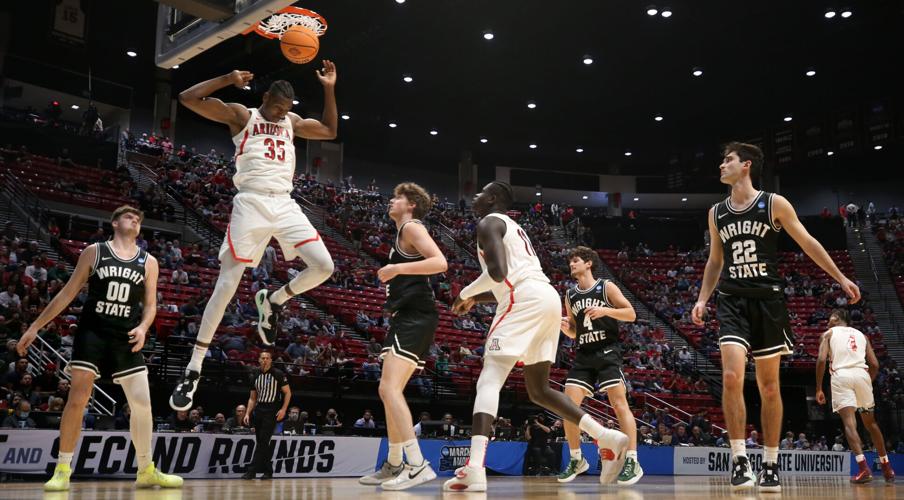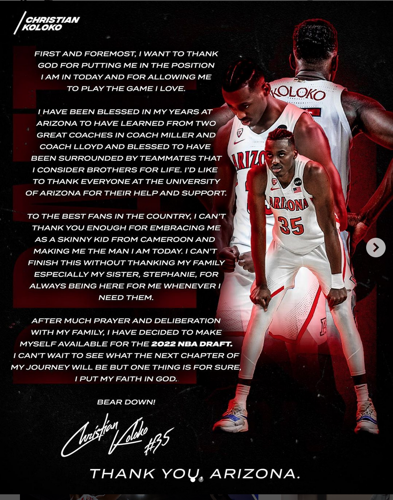After progressing from a lightly used freshman to the Pac-12's Defensive Player of the Year as a junior last season, Arizona center Christian Koloko is jumping to the pros.
Projected as a late first-round or early round pick, Koloko announced via social media Monday he is entering June's NBA Draft, becoming second Wildcat to do so after Bennedict Mathurin did last week. Neither player will return to the Wildcats.
Mathurin is a projected lottery pick, likely to slot into a guaranteed two-year contract worth at least $7 million, while Koloko's projected draft spot suggests he'll make at least $500,000 next season. The major mock drafts have Koloko going between No. 26 (The Ringer), late in the first round, and 36 (ESPN), early in the second.
"I can't wait to see what my next chapter will bring," Koloko wrote, "but one thing is for sure, I put my faith in God."
A third Arizona player, wing Dalen Terry, is considering whether to test the NBA Draft or return to school definitively. He has until Sunday to declare and, if he keeps open the option to return, has until June 1 to return.
Under newly relaxed rules, players can return to school if they hire agents who are certified by the NCAA and NBA Players Association and request an evaluation from the NBA undergraduate advisory committee.
Unlike Terry, Koloko is not eligible to profit from most name, image and likeness activity as an international student and his draft status suggests he can earn at least a significant six-figure sum next season.
If Koloko is taken late in the first round, he would be slotted for a guaranteed two-year contract worth at least $3.7 million, while high second-round picks are often guaranteed the rookie minimum, which is expected to be about $1 million next season.
Players taken lower in the second round often sign two-way contracts, which are expected to be worth half a million next season. Two-way contracts allow NBA teams to shuttle players who have participated in less than four seasons back and forth to the G League but the salaries are now half the rookie minimum ($462,629 in 2021-22).
Players are allowed to play in up to 50 of an NBA team's 82 games, and are paid the full amount regardless of how many they play. Until 2020, they were allowed to spend up to 45 days in the NBA, a limit former Wildcat guard Allozo Trier exceeded with the New York in 2018-19, prompting the Knicks to offer him a two-year contract worth $7 million.
In his statement, Koloko thanked former coach Sean Miller, current coach Tommy Lloyd, his teammates plus Arizona staffers and fans.
"To the best fans in the country, I can't thank you enough for embracing me as a skinny kid from Cameroon and making me the man I am today," Koloko said. "I can't finish this without thanking my family, especially my sister, Stephanie, for always being here for me whenever I need them."
Forever thankful Wildcats nation ❤️❤️ 🐻⬇️ pic.twitter.com/usbrkfMw6U
— CjKoloko (@kolokojunior1) April 18, 2022
After moving from Cameroon in 2017, Koloko moved in with his sister while enrolling at Birmingham High School in Southern California, where he was a teammate of former UA wing Devonaire Doutrive.
Koloko then moved to Sierra Canyon School in 2018-19 while committing to the Wildcats in November 2018, choosing the Wildcats over schools such as Cal, Harvard, Stanford, Vanderbilt, USC and UCLA.
As a freshman in 2019-20, Koloko did not play in four of his first eight games, but took advantage of an opportunity that arose when forward Stone Gettings suffered a concussion during the Wooden Legacy event during Thanksgiving week.
Koloko played in every game after that and logged double-figure minutes in seven of the Wildcats' final eight games that season before COVID hit. As as sophomore in 2020-21, Koloko started 19 of 26 games, averaging 5.3 points and 4.8 rebounds.
Koloko hit another level early as a junior last season. He earned the Main Event MVP award in November after averaging 17.5 points, 9.0 rebounds and 4.0 blocks in wins over Wichita State and Michigan in Las Vegas, outplaying preseason all-American Hunter Dickinson of Michigan.
Koloko went on to start all 37 of Arizona's games last season, despite leaving a Nov. 27 game against Sacramento State early because of a sprained ankle. He finished with averages of 12.6 points, 7.6 rebounds and 2.8 blocks, with his 102 blocks tying the Arizona single-season record set by Loren Woods in 1999-2000.





